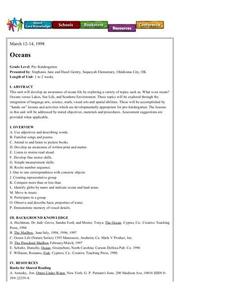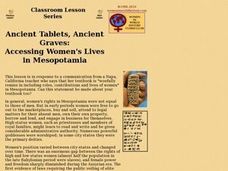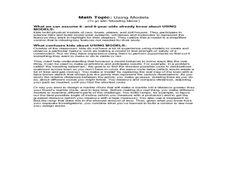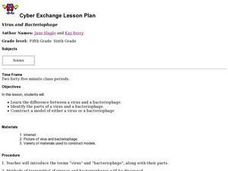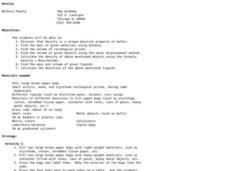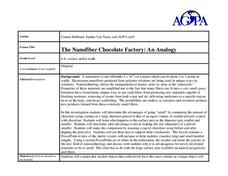Curated OER
From Bats to Babies: Ultrasound
Students research and analyze sound waves and how an ultrasound works to image a baby in utero. They explore various websites, complete worksheets, and write a paragraph describing a demonstration they view in the classroom.
Curated OER
Oceans
Students become aware of the differences between ocean water and lake water by smelling, tasting and seeing. They distinguish between land and bodies of water on a globe and gain increased awareness of oceans and life.
Curated OER
Ancient Tablets, Ancient Graves: Accessing Women's Lives in Mesopotamia
Students explore the role of women in ancient Mesopotamia. Several excerpts from the Mesopotamian cuneiform tablets and artifacts are analyzed to determine the treatment, rights, and powers of women in this era.
Curated OER
Density And Volume
Sixth graders explore the concept of density as a relationship of an object's mass to its volume. Densities of a variety of objects are compared and used to identify an unknown object.
Curated OER
Modeling Mania
Learners describe techniques helpful in solving spatial problems which utilize the notion that a model is a simplified version of something complicated. They utilize methods such as sketching or drawing possible solutions to a problem.
Curated OER
Learning the Structure and Function of DNA
Students read about Humane Genome Project, examine structure and function of DNA, and participate in gel-electrophoresis lab. They complete Internet activity to test their knowledge of DNA.
Curated OER
Vitamin C and Protein Analysis
Young scholars analyze various beverages to determine vitamin C content. Students research diseases resulting from vitamin C deficiencies and identify countries most affected.
Curated OER
Using Thin Layer Chromatography To Identify amino Acids In Solution
Learners will work in groups to design and conduct an experiment to identify amino acids found in an unknown solution. This lesson is taught in three sections: (1) Introduction to chromatography (2) Experimental design session (3)...
Curated OER
SAFETY KNOWLEDGE BASE CHANGES
Students research and formulate a hypothesis for research to correlate changing safety regulations in regards to personal and environmental safety polices for storage, handling and disposal of chemicals, risk involved in hazardous...
Curated OER
Numbers in Art
Young scholars choose a number from one to twelve and tell a number story about it. They listen to the teacher read "Numbers in Art" by Lucy Micklethwait. Students choose three numbers from one to twelve and view works of art while...
Curated OER
Frosty the Snowman Meets His Demise: An Analogy to Carbon Dating
Learners read and discuss an article about carbon dating, then participate in a hands-on lab to discover how carbon dating works. Students also write a letter to a friend explaining the process, and how archeologists use the process to...
Curated OER
Volume of Gas
Eighth graders investigate the effect of temperature on the volume of a gas in a closed container. They measure the height of the water in their beaker/container, conduct their experiment, and create a graph to illustrate their data.
Curated OER
Flambe Elements
Eighth graders discuss atoms and electrons as well as atoic structure. They view atomic structure via the computer. Students watch a demonstration in which the teacher demonstrates glass tubing turning yellow in a Bunsen Burner flame....
Curated OER
How can pH be used to determine possible product tampering?
Students investigate the strength of acids and bases experimentally. They answer the question, "How can pH be used to determine possible product tampering?" by testing acids and bases with litmus paper.
Curated OER
The Case Of The Sour Employee
Ninth graders are presented with a problem that has to be solved. The scenario is a mystery that is purely hypothetical. This does draw on the knowledge of previous lessons. The lesson plan contains background knowledge explaining the...
Curated OER
Virus and Bacteriophage
Students examine the differences between a virus and a bacteriophage. They explore various websites, identify the parts of a virus and a bacteriophage, and construct a model of a virus or bacteriophage.
Curated OER
Animal Alphabet
Second graders identify animals with each letter of the alphabet. In groups, they create a PowerPoint presentation which shows the information they have collected about each one. Using all of this information, they create an animal...
Curated OER
Compounds and Mixtures
In this compounds worksheet, students draw a line to match the word with the definition. Students also match foods with their correct term.
Curated OER
Air Is All Around Us!
Students design an instrument to show that air is all around. For this air lesson plan, students research, construct, and present a design that proves that air is all around, even though they can't see it or touch it. A teacher and...
Curated OER
Polymer Basics
In this polymer worksheet, students use an on line site to complete sentences about plastics, their chemical make-up, their uses, their history and information about recycling plastics.
Curated OER
What is in the Water?
In this mixtures worksheet, learners read about mixture and what determines if a solute dissolves in a solvent. They answer three questions about solutions and determine from a list of compounds which are soluble in water.
Curated OER
Density
Learners find the mass, volume, and density of various objects. In this density measurement lesson, students observe how same-sized objects can have different masses, then use water displacement to find the density of each object and...
Curated OER
The Nanofiber Chocolate Factory: An Analogy
Students investigate Nanotechnology. In this physic's lesson, students evaluate a hands-on model made from chocolate syrup and pretzels to determine the advantages of size. Students weigh chocolate syrup to determine it's wait...
Curated OER
Different Minerals
In this minerals worksheet, learners read about the relationship between elements, rocks and minerals. They experiment using 6 different colored gumdrops to represent 6 common elements. Students construct gumdrop and toothpick models of...
Other popular searches
- Properties of Matter
- Physical Properties of Matter
- Properties of Matter Song
- Useful Properties of Matter
- Science Properties of Matter
- Properties of Matter Booklet
- Properties of Matter Lecture
- Compare Properties of Matter
- Chemical Properties of Matter
- Social Properties of Matter
- Properties of Matter Test
- Intensive Properties Matter

